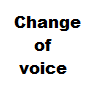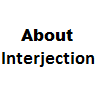What is adverb?
An
adverb is a word used for qualifying (or adding something too) the meaning of a
verb, Adjective or other adverb.
Adverb
answers the questions of ‘HOW’ , ‘WHEN’, or ‘WHERE’.
An
adverb is a word that adds something to the meaning of a verb, an adjective or
another adverb.
More uses
of adverbs
He is quite old.
My grandmother walks very slowly.
Men shouts very loudly.
Amar writes quickly.
ADVERBS OF
TIME
He came here yesterday.
Take exercise daily.
Then he was sorry.
It rained yesterday.
He may come today.
Long, long ago there was a king named Bharat.
Note: yesterday, today, ever, ago, always,
then, now, soon , still, yet, never, occasionally, often, twice these words are
used to make understand of what is adverbs of time.
Adverbs of time
|
Ago
|
|
Already
|
|
Always
|
|
Again
|
|
Afterwards
|
|
Now
|
|
Then
|
|
Before
|
|
Immediately
|
|
Instantly
|
|
Presently
|
|
Formerly
|
|
Soon
|
|
Often
|
|
Once
|
|
Twice
|
|
Thrice
|
|
Late
|
|
Tomorrow
|
|
Yesterday
|
|
Today
|
|
Daily
|
|
Early
|
|
frequently
|
Adverbs
of frequency:
Adverbs that uses to mean how often
is called adverb of frequency.
Example: I have told you twice
He
often makes mistakes
I
have not seen him once.
He
seldom comes here
The
postman called again
He
always tries to do his best
He
frequently tells a lie.
Adverbs of place
Here lived great man
Shall I find you there?
Come near
Adverbs of place
|
Hither
|
Abroad
|
|
Thither
|
Ahead
|
|
Here
|
Overhead
|
|
There
|
Next door
|
|
Hence
|
Out of doors
|
|
Thence
|
Inland
|
|
Far
|
Locally
|
|
Near
|
World wide
|
|
Nearby
|
Universally
|
|
Away
|
Adverbs of comparison:
You
can spare very little
Father
is much pleased.
All
of us are very much happy for your
success.
I
am very much pleased to have your
letter.
He
speaks very slowly.
O
God! Strike me more.
The
work is almost done.
I
have done enough for you.
Note:
the above bold words are uses for quantity of adjectives or verb.
Where;
do not say much, here much is use for quantity of say verb.
I
am much surprised to learn you
conduct.
“much”
is use for quantity of surprised
adjective.
In
adverbs degree of comparison are in three stages:
Positive : only single subject
comparison
Comparative : comparison between two
subjects.
Superlative: comparison between all or
more than two subjects.
Following
methods are uses for degree of comparison in adverbs.
A.
Two or more SYLLABLE Adverb need to add more or less to
convert in comparative and most or least to convert in superlative degree.
|
positive
|
comparative
|
superlative
|
||
|
Quickly
|
more
|
Quickly
|
most
|
Quickly
|
|
less
|
least
|
|||
|
Slowly
|
more
|
Slowly
|
most
|
Slowly
|
|
less
|
least
|
|||
|
Carefully
|
more
|
Carefully
|
most
|
Carefully
|
|
less
|
least
|
|||
|
Beautifully
|
more
|
Beautifully
|
most
|
Beautifully
|
|
less
|
least
|
|||
|
wisely
|
more
|
wisely
|
most
|
wisely
|
|
less
|
least
|
|||
|
Bravely
|
more
|
quickly
|
most
|
Bravely
|
|
less
|
least
|
|||
|
Loudly
|
more
|
quickly
|
most
|
Loudly
|
|
less
|
least
|
|||
|
Swiftly
|
more
|
quickly
|
most
|
Swiftly
|
|
less
|
least
|
|||
B. Adverbs which are single enabled,
add “er” at the end to convert in comparative and “est” to convert in
superlative Degree.
|
positive
|
comparative
|
superlative
|
|
Loud
|
Louder
|
Loudest
|
|
Early
|
Earlier
|
Earliest
|
|
Slow
|
Slower
|
Slowest
|
|
Long
|
Longer
|
Longest
|
|
Near
|
Nearer
|
Nearest
|
|
Late
|
Later
|
Latest
|
|
Latter
|
Last
|
|
|
Soon
|
Sooner
|
Soonest
|
|
Fast
|
Faster
|
fastest
|
|
Hard
|
Harder
|
Hardest
|
C. Some adverb never follows
rules for converting to comparative and superlative degree.
|
positive
|
comparative
|
superlative
|
|
Well
|
Better
|
Best
|
|
Bad
|
Worse
|
Worst
|
|
Much
|
More
|
Most
|
|
Little
|
Less
|
Least
|
|
Near
|
Nearer
|
Next, Nearest
|
|
Far
|
Farther
|
Farthest
|
|
Late
|
Later
|
last
|
Adverb of
Manner:
The
Train is running fast.
I
take it gladly
The
tiger went away slowly.
Do
your duty honestly.
They
did it bravely.
We
respectfully pray.
These
students humbly said.
The
workers passed off quietly.
The
above bold adverbs represent the type of Verb; and so call Adverb of manner.







0 Comments
Thank you for your comment.